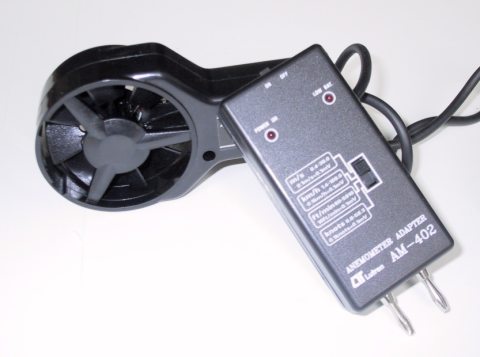Socket-A & Socket-370 Cooler Roundup - November 2000
by Tillmann Steinbrecher on November 21, 2000 1:36 AM EST- Posted in
- Cases/Cooling/PSUs
Fan performance
To find out whether a heatsink design is good, the performance measurement alone is not enough - very interesting is the question: how much air flow does a heatsink require to reach its peak performance? If two heatsinks with different fans have identical cooling performance, the one with the weaker fan clearly has the superior heatsink design, since it requires less airflow to reach the same performance as its competitor. We didn't want to trust the air volume specifications from the fan manufacturers, so we measured fan air speed ourselves. For this test, we used a Lutron AM-402 aneometer adapter. The fans were uninstalled from the heatsinks, and air speed was measured 3 cm away from the fan, to avoid inaccuracies due to air turbulences right behind the fan blades.

Measurements - fan air speed
|
Heatsink/fan
|
Air speed |
|
Kanie Hedgehog-238M
Delta 60x25mm fan |
|
|
Global WIN FOP38
Delta 60x25mm fan w/grille |
|
|
Kanie Hedgehog-238M
YS Tech 60x25 fan |
|
|
Alpha PAL6035
YS Tech 60x25 fan |
|
|
Global WIN FOP32
YS Tech 60x25mm fan |
|
|
Taisol CGK742092
Delta 60x10mm fan |
|
|
Alpha PAL6035
Sanyo Denki 60x25mm fan |
|
|
Cooler Master DP5-5K11
50x10mm Delta (1) |
|
|
JMC (RDJD) Arctic Breeze
Plus
JMC proprietary 60x15mm (2) |
|
|
Thermaltake "Super Orb"
Thermaltake embedded fans (3) |
n/a |
|
Agilent ArctiCooler
embedded fan, unknown mfr (3) |
n/a |
![]() Air speed
Air speed
(1) We're measuring air speed,
not air throughput. Therefore the value from a 50mm fan cannot be directly
compared to a 60mm fan.
(2) Air speed depends on
temperature
(3) The fan(s) is/are embedded
into the heatsink and are therefore incompatible with our test setup










0 Comments
View All Comments